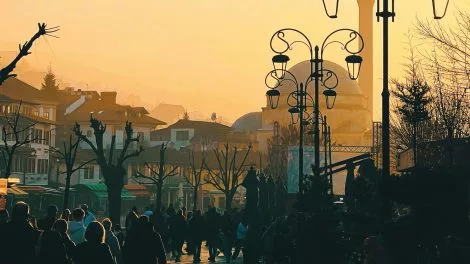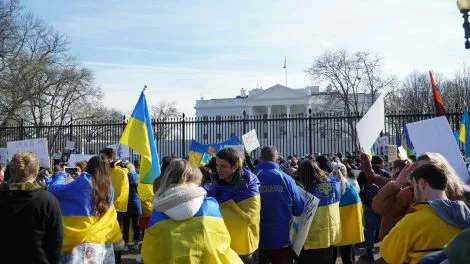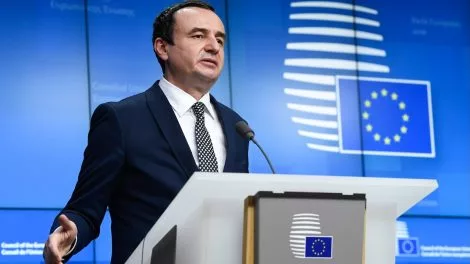The detention last week of three Bulgarians at the border with North Macedonia is the latest in a series of tit-for-tat events between the two countries that threatens to once again derail Skopje’s EU bid.
Disputes with its neighbours over the interpretation of history have plagued North Macedonia’s EU accession ambitions for years, and even after a great deal of work by a joint Bulgarian-Macedonian history commission, they threaten to do so once again.
- NATO and the EU have never been closer
- Bosnia gets EU candidate status, but only if it meets certain conditions
- Local indifference to Ottoman heritage sites in the Balkans opens door to Turkey
Last weekend, a large number of Bulgarians crossed the border with North Macedonia to commemorate the 151st anniversary of the birth of Ottoman-era revolutionary Gotse Delchev, in Skopje.
While authorities in both countries feared clashes could erupt between rival nationalists, the scene in North Macedonia’s capital remained calm. The scene on the Bulgaria-North Macedonia border, however, was another story.
Authorities in North Macedonia claim that issues with electricity supply caused delays for some Bulgarians crossing the border. Bulgaria’s interim Minister of Interior Ivan Demerdzhiev mocked this official explanation and alleged that North Macedonia has orchestrated the delays. Other Bulgarian politicians accused North Macedonia of making secret ‘blacklists’ of Bulgarians who should be prevented from entering the country.
Three Bulgarians, including former MP Angel Georgiev, were detained attempting to cross the border. In a statement about the incident, police in North Macedonia said, “They first behaved rudely and inappropriately, using derogatory words, and then tried to physically attack the police officers in the performance of their duties, which was a reason for their arrest”.
History together
In 2020, Bulgaria vetoed the negotiating framework that would have allowed North Macedonia to begin EU accession talks.
The veto was a blow to North Macedonia which had just a year earlier, in 2019, ended another long-running dispute with Greece over the use of the name Macedonia. Just as Greece contested North Macedonia’s historical claim to the region of ‘Macedonia’, Bulgaria cited “the revision of our common history, the denial of our common ethnic and linguistic roots or the unfounded claims for the existence of a ‘Macedonian minority’ in Bulgaria” as actions by North Macedonia that justified its veto.
Among the sticking points for Sofia is the ethnic origin of Gotse Delchev. Although North Macedonia also claims him as a national hero, Bulgaria insists he must be recognised as Bulgarian. Bulgaria also objected to the use of the phrase ‘Macedonian language’ in the EU negotiating framework as it considers Macedonian to be a dialect of Bulgarian.
Textbooks in North Macedonia meanwhile refer to Nazi-allied Bulgaria’s three-year occupation of Macedonia during World War II as an “occupation”, but Bulgaria requested this be instead referred to as a period of “Bulgarian administration”.

‘Anti-Bulgarian campaign’
Tsar Boris III of Bulgaria, the king who presided over Bulgaria’s alliance with Nazi Germany and the deportation of Macedonia’s Jews to the Nazi death camp at Treblinka, is the namesake for a Bulgarian cultural club in North Macedonia’s lakeside town of Orhid that has provoked local anger in recent months. Another cultural club in Bitola, named after Nazi collaborator Ivan Mihailov, has spawned similar outrage.
Hristian Pendikov, the secretary of the club in Ohrid, was attacked on January 19. Macedonian authorities apprehended suspects and condemned the attack. Nevertheless, Bulgaria’s parliament passed a declaration condemning the attack and an alleged “anti-Bulgarian campaign” in North Macedonia.
Last summer, Bulgaria agreed to lift its veto on North Macedonia’s EU accession as part of a deal, brokered by France, in which North Macedonia’s Bulgarian minority is recognised in its constitution.
However, last week’s declaration said, “the escalation of the anti-Bulgarian campaign in North Macedonia may threaten the process of inclusion of Bulgarians in the country’s constitution” and thus threaten the compromise securing North Macedonia’s path to EU accession.
The declaration was passed two days before last weekend’s events at the border.
Unlike many news and information platforms, Emerging Europe is free to read, and always will be. There is no paywall here. We are independent, not affiliated with nor representing any political party or business organisation. We want the very best for emerging Europe, nothing more, nothing less. Your support will help us continue to spread the word about this amazing region.
You can contribute here. Thank you.

Published by: emerging-europe.com




